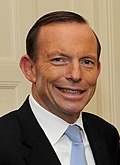Nigel Scullion | |
|---|---|
 | |
| Minister for Indigenous Affairs | |
| In office 18 September 2013 –29 May 2019 | |
| Prime Minister | Tony Abbott Malcolm Turnbull Scott Morrison |
| Preceded by | Jenny Macklin |
| Succeeded by | Ken Wyatt |
| Deputy Leader of the National Party | |
| In office 3 December 2007 –13 September 2013 | |
| Leader | Warren Truss |
| Preceded by | Warren Truss |
| Succeeded by | Barnaby Joyce |
| Minister for Community Services | |
| In office 30 January 2007 –3 December 2007 | |
| Prime Minister | John Howard |
| Preceded by | John Cobb |
| Succeeded by | Jenny Macklin |
| Senator for the Northern Territory | |
| In office 10 November 2001 –17 May 2019 | |
| Preceded by | Grant Tambling |
| Succeeded by | Sam McMahon |
| Personal details | |
| Born | Nigel Gregory Scullion 4 May 1956 London,England |
| Citizenship | Australian British (1956–2001) [1] |
| Party | Country Liberal Party |
| Other political affiliations | The Nationals (federal caucus) |
| Spouse(s) | Jenny Scullion (divorced) Carol Sexton |
| Children | 3 |
| Occupation | Fisherman |
Nigel Gregory Scullion (born 4 May 1956) is a former Australian politician who served as a senator for the Northern Territory from 2001 until 2019. He was a member of the Country Liberal Party (CLP) and sat with the National Party in federal parliament. He held ministerial office under four prime ministers.
Contents
Scullion was a professional fisherman prior to entering politics. He was first elected to the Senate at the 2001 federal election,and briefly served as Minister for Community Services in the Howard government in 2007. He was deputy leader of the National Party from 2007 to 2013,the first senator to hold the position,and served two terms as the party's Senate leader (2007–2008 and 2013–2019). In 2013,Scullion was appointed Minister for Indigenous Affairs in the Abbott government. He held the same position in the Turnbull and Morrison governments before retiring from parliament at the 2019 election. He was the only minister to hold the same portfolio in those three governments.


